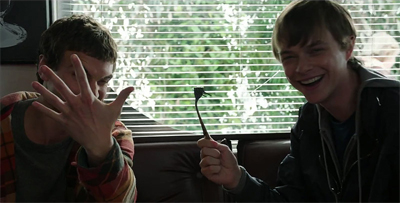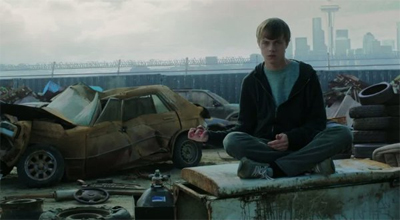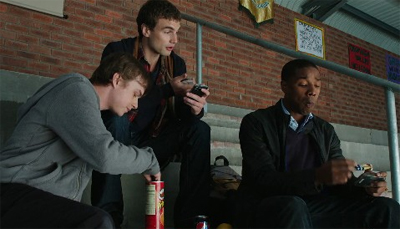Chronicle is a fascinating deconstruction of the American superhero myth – the notion that “with great powers comes great responsibility”, as Stan Lee once wrote (albeit in a more convoluted fashion). Much like Fox’s other major release this week (Martha Marcy May Marlene), it represents an impressive theatrical debut from a young director who hopefully has a long and distinguished future ahead of him. While there are elements of Chronicle that do lack a bit of polish, it’s a compelling and engaging film, one that succeeds at picking apart some of the core assumptions of the superhero genre.
The biggest problem with Chronicle is actually one of format. It’s a “found footage” film, which I honestly thought was a narrative gimmick that had sort of played itself out. The problem with a found footage approach is that it tends to call attention to itself, confining the narrative to what could conceivably be documented by the characters involved. It’s telling that the last truly successful “found footage” film, District 9, blended that sort of hand-held approach with a more conventional style, seamlessly dropping the documentary feeling when it no longer fit. I can’t help but wonder if the first half of the film might have worked better had Trank been willing to step outside the format.
Of course, it serves a purpose, as it frequently does in stories like this. Director Josh Trank and writer Max Landis seem to have realised that even the most unconventional of superhero films still requires a fairly grand third act, a massive albeit conventional climax. The use of in-story video equipment allows Trank and Landis to offer the film a suitably fitting large-scale final conflict, but without sacrificing the relative intimacy of the story. While it does eventually become something akin to an action sequence, the use of the “found footage” allows Trank to keep the story grounded amid flying and telekinesis and all sorts of other trappings of more standard superhero fare.
This approach does come with a cost. In short, the film is always aware that the audience is aware that the use of all this video footage is a little… strange. While the era of smart phones might have put a video camera in everybody’s hands, Chronicle seems to take place in a universe where almost everybody actually uses it. Cloverfield managed to rationalise this incredibly surreal usage of the camera by giving us a reason the character started filming (the party) and a reason why they kept filming (to presumably make a tonne of money if they got out alive). Chronicle doesn’t do anything quite as sophisticated – Andrew just starts “documenting” his life for some reason, never really explored, possibly because that’s just what vaguely creepy loners do.
In fairness, Landis’ script knows that the audience is probably a bit skeptical about this as a storytelling device. So it repeatedly calls attention to the fact. “Are you going to film everything?” Andrew’s cousin Matt asks him, allowing the amateur film-maker to reply in the affirmative. A cheerleader points out how creepy Andrew filming them is. When a character visits a patient in police custody, we’re informed through dialogue that the camera needs to keep rolling. The man-to-man face-off towards the end of the film comes with sweeping camera angles and quick cuts, rationalised by one of the participants hijacking every video-phone in the area.
The problem is that this makes us wonder about how the practicalities of it. Andrew’s first camera films on video, so how does it run so long? How is it ultimately recovered after a dramatic incident and how is the footage okay? How come Andrew’s father leaves the camera running when he steals it and decides to give out to his son? All of these, of course, are rationalised by suspension of disbelief, but Landis and Trank undermine it by repeatedly drawing attention to it. Still, if you can get past that minor hurdle, Chronicle actually a fairly clever look at the superhero film.
Feeling like a more cynical and more serious companion piece to Kick-Ass, Chronicle is a fairly hard look at the Spider-Mansuperhero origin. There must be something about that back story is so fascinating, because we keep returning to it. A kid gets handed a huge amount of power, and matures with it to become a responsible adult, overcoming all the trials and difficulties that such an obligation creates – somehow finding the inner strength, despite his circumstances, to resist the temptation to abuse or misuse his gift. While Kick-Ass dared to question the sanity of such unrelenting optimism, Chronicle instead dares to ask what might happen if such power ended up in the wrong hands. How lucky is it that Peter Parker was able to harness his gift in his own terrible circumstances and turn it to good?
The plot is familiar. Three kids stumble across a strange object that grants them mysterious powers. It’s never explained, serving its purpose as a plot device before being conveniently written out. It’s no more ridiculous than a radioactive (or even genetically-engineered) spider bite or a mysterious “x gene” that allows one person control over metal and another one control over minds. Instead, the film is focused on what happens to the people given that sort of power. There’s Andrew, the lonely social outcast; there’s Matt, the philosophy-quoting outsider with a superiority complex; and there’s Steve, the all-round nice guy and well-loved student president.
The circumstances also seem like they could have been lifted from any superhero story ever. Matt and Andrew aren’t successful with girls, they lack any real friends aside from each other. (And, even then, they weren’t necessarily that close.) Andrew’s family is under severe financial pressure, and he’s bullied at school. His mother is sick and dying – while his father is both abusive and absent. Those details seem quite familiar, because the superhero myth would tell us that adversity forms character. Our heroes are heroes because they can overcome hurdles like that, right? It’s not too difficult to imagine that Dane DeHaan’s Andrew and Andrew Garfield’s Peter Parker might have a lot to talk about.
Why do we assume that superheroes are immediately physically and emotionally equipped to deal with their powers? Here, a casual demonstration of mental power nearly drowns an innocent person, if only because those involved had no idea of their own strength. A later (incredibly simple) miscalculation while disarming somebody results in a massive explosion, and at least one death, doing the kind of thing that other fictional superheroes seem capable of doing without batting an eye. It’s brilliantly clever and wryly subversive, chipping away at the notion of the superhero in a way that a lot of other films have tried, but few have really succeeded.
I think a lot of the success is down to the way Trank handles his cast and his plot. it’s amazing to imagine how miniscule the budget for this film was. While some of the CGI might be a little bit ropey, Trank is able to make flying fun once again – something that Martin Campbell’s Green Lantern and Bryan Singer’s Superman Returns were seemingly unable to do. There’s a genuine sense of wonder about what these three characters can do – effortless brought to life by three actors with great chemistry, but also by Trank’s skill. The climax of the film in particular is impressive, rendering property destruction on the scale of Louis Leterrier’s The Incredible Hulk, but with a greater sense of urgency and threat.
Ironically, Josh Trank is able to offer one of the most convincingly human portrayals of superhuman powers I’ve seen in quite a while, despite picking apart the genre. I’m glad that Fox has picked up on his skill, but I’m a little nervous about shackling him to their Fantastic Four reboot – it seems almost regressive to anchor him to one of the most conventional of superhero teams after offering a rather brutal deconstruction. In fact, I’d almost rather he was given a much broader choice for his next film, but if you had to give him a big-budget superhero adaptation, put him on a character that lends himself to a more cynical take, like Daredevil. He’s certainly an infinitely better fit than David Slade.
Chronicle isn’t perfect. It has some flaws stemming mainly from its format. However, if you can go along with the “found footage” approach even through the more awkward of moments, it’s a rewarding examination of the core of the superhero story.
Filed under: Non-Review Reviews | Tagged: Andrew, Andrew Garfield, Chronicle, chronicle (film), chronicle (movie), Dane DeHaan, film, Josh Trank, Martha Marcy May Marlene, Max Landis, Movie, non-review review, Trank |


























I just saw this film today and quite liked it despite the loopholes in the execution. I thought the best part of the movie was actually the great cast who worked so well together. Great review 🙂
Cheers, glad you liked it!
I saw “Man on a Ledge” instead of this one, but I’m going to have to get my butt back tto the movies – soon!
It was a great week to be a cinema fan. Something for everyone!
Thank’s for the review. You write well too, I’ll be back for more!
Glad you like it, cheers!
I have to go see this movie! Great review I might add 😀
Thanks. It’s worth a look if you like your superhero movies with a bit of an edge. Just be aware of how heavily they lean on the found footage gimmick.
This was a very informative and great blog. I have to say, I saw this movie and was a bit torn. I didn’t like the camera angles and seeing things through Andrew’s camera the whole time. Other then that, I thought the plot was brilliant and a change from the Status Quo of Superhero’s. You see a unstable (Andrew) boy who has such pain inside that the powers he gets just take and magnify that pain to the breaking point. I have to say I didn’t expect a lot of what happens, I was left surprised at some points… which is always good… so many movies are so predicatable and well, if you read my blog… Unpredictable is what I treasure. Over all this movie deserves two thumbs up! Thanks for this review.
I’m glad you enjoyed it. I agree that the “found footage” angle was just a bit much.